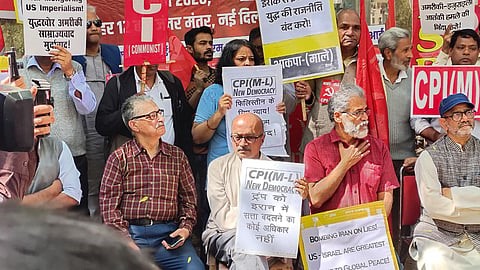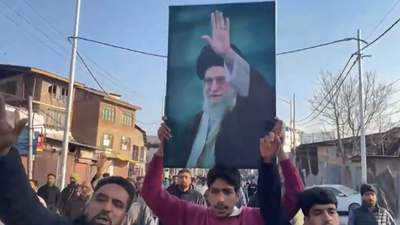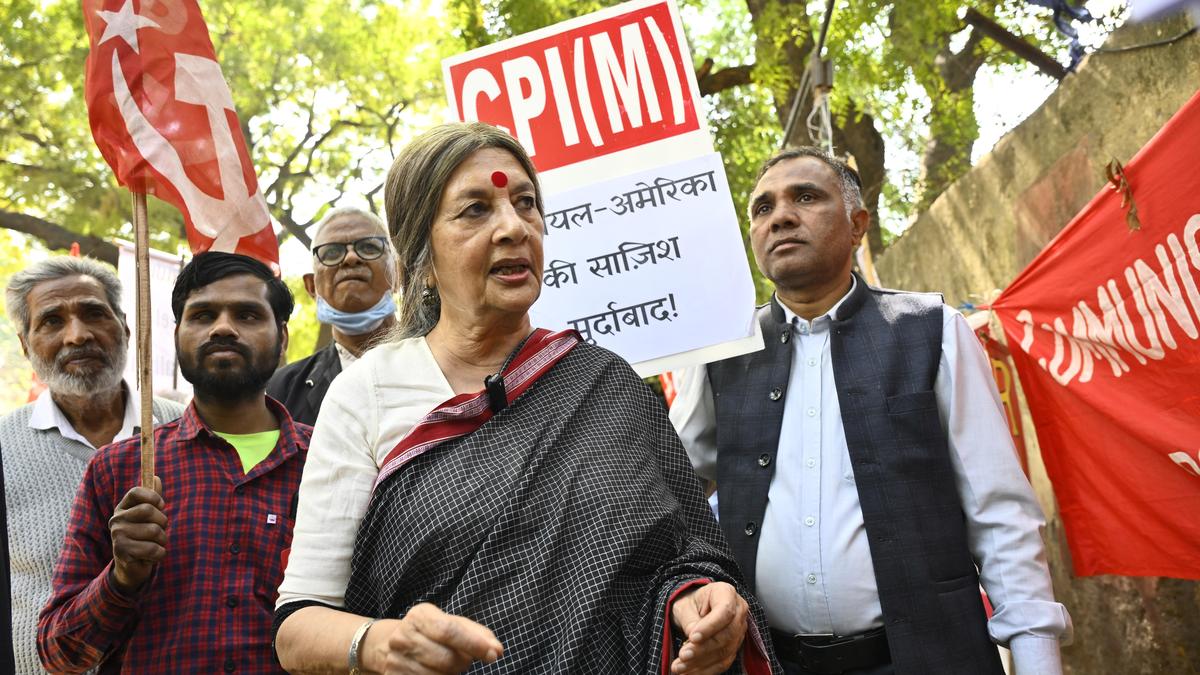Delhi, Kashmir, Lucknow, Hyderabad, widespread demonstrations and protests broke out all over India at the US-Israel’s strikes against Iran, actions that clearly violated international law; Iran and the US were in the midst of negotiations and dialogue when the US-led by President Donald Trump launched strikes on Saturday February 28. Scenes of extreme distraught and sloganeering were also witnessed in New Delhi, Bihar, Jharkhand, and Telangana, where protesters, holding Khamenei’s posters, voiced their anger against the US and Israeli military actions.
Within the country, India, opposition to the US-Israeli war has not only come from left parties, but also mainstream opposition. The Indian National Congress (INC), India’s main opposition party, said in a statement on Sunday, March 1 “The targeted use of force to destabilize the leadership and governing structures of the sovereign state-whether in Iran or earlier in Venezuela-signals a disturbing revival of regime change doctrines and coercive unilateralism.” INC leaders called the Indian government’s failure to issue condemnation against the assassination of Khamenei “shameful and political cowardice.”
Chief of the Congress Parliamentary Party (CPP), Sonia Gandhi in a powerfully worded Op-Ed in The Indian Express On Tuesday, March 3, was damning. Titled, Government’s silence on killing of Iran leader is not neutral, it is abdication, the article states, “India has long invoked the ideal of vasudhaiva kutumbakam — the world is one family. That civilisational ethos is not a slogan for ceremonial diplomacy; it implies a commitment to justice, restraint and dialogue, even when doing so is inconvenient.”
Most vocal, in action and deed, have been the left, the Communist parties in India also issued condemnation to Israeli-US aggression and demanded the Indian government to take a proactive stand against the war. Besides, the left parties organized protests in different parts of the country to oppose the Israeli-US aggression against Iran and demanded the Indian state take a clear stand in support of UN Charter and international law. The protesters urged people to “stand against the attack” and express solidarity with the Iranian people.
Shia Muslims take to the streets in protest
Ordinary people, Shia Muslims and masses of people took to the streets in anti-war demonstrations in Srinagar and Kargil in the north, to Hyderabad and Chennai in the south. One of the largest demonstrations was recorded in the northern city of Lucknow, the capital of India’s largest state Uttar Pradesh. The Hindistan Times, The New Indian Express and The Hindu have reported these protests.
On February 28 and March 1, the US and Israel launched coordinated strikes on Tehran in what they called a pre-emptive attack — Operation Epic Fury and Operation Lion’s Roar respectively.
Khamenei was killed at his workplace in the early hours of Sunday, and Iran’s Tasnim News Agency and state television confirmed this. Thereafter, Iran declared 40 days of national mourning and launched retaliatory missile and drone strikes, targeting 27 American military sites according to the IRGC.

Delhi
On Tuesday, March 3, it was the left parties that held a protest at Jantar Mantar against the US-Israel attack on Iran and the killing of Ayatollah Ali Khamenei, the Supreme Leader of the Islamic Republic, accusing the Union government of maintaining silence on the issue.
At the protest, Communist Party of India (Marxist) leader Brinda Karat said that through the protest they were raising their voice against United States President Donald Trump’s “imperialist bullying” and against “Zionist Israel’s aggression”. Brinda Karat also questioned Prime Minister Narendra Modi’s visit to Israel a day before the strike on Iran.
“Why is Narendra Modi silent regarding Trump’s imperialist aggression towards Iran? Why is he quiet about the attack carried out on Iran? Holding the bloodstained hands of Netanyahu of Israel, he said this is the voice of the people of India. Which people’s voice is this? Did you go to Israel to offer support? Moreover, within 24 hours, there was an attack on Iran. Did you go there to give India’s approval stamp to it?” Karat said. She added that India’s foreign policy is guided by certain principles and that Modi should view foreign relations from the perspective of national sovereignty.
All leaders in the protest have also urged people to express solidarity with Iranians.
“The silence of the government over (U.S. President Donald) Trump’s imperialist hooliganism, the attack on Iran… Why is Narendra Modi quiet,” asked CPI(M) leader Brinda Karat. “He held (Israel Prime Minister Benjamin) Netanyahu’s bloodied hands and said it is the voice of the people of India… How is this the voice of the people? You went to Israel to help a genocide,” she said. Ms. Karat said the attack on Iran came within 24 hours of Prime Minister Modi’s return from Israel. “Did you go there to give a stamp of approval,” she asked.
“We are raising our voices against the bullying of the U.S. and Zionist Israel,” she said, adding that Mr. Modi should look at foreign relations from the perspective of national sovereignty. “You (Mr. Modi) have bowed to Trump, and (are) silent over the issue. This is pro-imperialist foreign policy,” she said.
“We demand that the government of India take steps to stop the war and restore peace… Modi ji was in Israel, the war started after he returned. It is our responsibility to ensure India has no role in this war,” Mr. Bhattacharya said.
He said the war will “impact India” as many Indians work in West Asian countries. “Iran is an ancient civilisation with friendly and cultural relations. This has happened with Palestine, and now with Iran. It is clear Iran is ready to fight back,” he said, adding that the people of India stand with Iran. In the context of Modi’s visit to Israel, he said the Indian government must immediately take steps to stop the war and work towards peace.
“We know that Modi ji went to Israel. He came back and the war started. Therefore, it is our responsibility to ensure that there is no partnership with India in this war. In Iran, we saw that the Supreme Leader was assassinated. The Supreme Leader of Iran is not only the leader of Iran but also a religious leader for the Shia community worldwide,” he said. These Left leaders alleged that the United States was “shedding crocodile tears in the name of women”.
“We saw that in Iran, women are fighting for their freedom. In the same Iran, more than 100 girls were killed in a primary school. America and Israel did it. Thousands have lost their lives in the last four days in Iran. This war will have a severe impact on India after Iran, as many Indians work in West Asian countries,” Bhattacharya said.
In Delhi, the Imam of Shia Jama Masjid, Maulana Mohd Ali Mohsin Taqvi, warned of a dangerous new precedent. “Every person in favour of justice and sovereignty of a country is deeply saddened today. The world is about to witness worse days. The President of any country can be abducted; any country’s leadership can be killed with bombs. It was Iran today, tomorrow it may be Türkiye, Saudi Arabia.”
Taqvi described Khamenei as “a simple man and a major scholar of the Islamic world who never bowed in front of the oppressors”, and announced a condolence gathering at the mosque.
The Iranian Embassy in New Delhi lowered its flag to half-mast. The J&K Shia Association stated: “We mourn the martyrdom of the family members of Imam Khamenei. Our prayers are with the Leader and the people of Iran.”
Hyderabad
The CPI-M also held protests at Hyderabad, capital of Telangana against the US-Israel attacks on Iran. On Monday, March 2, the CPI-M organised a protest rally at Sundarayya Vignana Kendra here, condemning the attacks by the United States and Israel on Iran. At the protest rally, addressing the gathering, CPI(M) Politburo member B V Raghavulu alleged that the US had turned into an “international terrorist force” by carrying out aggressive actions against several countries. Raising slogans against American imperialism and war hysteria, party activists expressed solidarity with the Iranian people. CPI-M State Secretary John Wesley, also accused the US of destabilising nations, destroying economies and violating international law, citing attacks on Gaza, Iran, Cuba and Venezuela. He also criticised the union government for remaining silent on the attacks and questioned Prime Minister Narendra Modi’s stance, calling for intensified protests to pressure the Centre.
Besides, CPI(M) leaders R. Arun Kumar, T. Jyothi, M. Eshwarayya and several state and mass organisation leaders participated in the protest.
Protest rally, mourning over death of Iran’s Khamenei in Hyderabad’s old quarters
Meanwhile, also in Hyderabad, Shiite muslims mourn the death Iran’s Supreme Leader Ayatollah Ali Khamenei during a demonstration against US and Israel forces attack on Iran, organized by Tanzeem-e-Jafferi from Mazaar-e-Ibne Khatoon, Purani Haveli, in Hyderabad on Sunday, the very next day after the Us-Israel attacks.
A wave of grief spilt onto the streets of Hyderabad’s old quarters as the news of the death of Iranian Supreme Leader Ali Hosseini Khamenei spread in the morning. By afternoon, summoned by social media messages, hundreds of men, women and children in black turned up near the grave of Ibne Khatoon. Some men wailed as they addressed their gathering, while others shouted “Shahdat, shahadat” (martyrdom, martyrdom); reported The Hindu.
“The U.S. is mistaken if it thinks Iran is finished with this bomb attack. Iran is alive, and we are with Iran. America murdabad,” shouted one speaker as reported by The Hindu. “He is our spiritual leader. That is why there is so much grief. That’s why I have turned up here,” Mujahid, a resident of Dar ul Shifa. The protest in the afternoon was organised by Tandem-e-Jafferi.
Later in the evening, post-Iftaar, there were two similar protests in the locality with hundreds of other protesters and grief-stricken residents marching beating their chest with their right arm. The protest started from Ibadan Khan and culminated near Alawa-e-Sartouq in Darulshifa at 8 p.m..The Dar ul Shifa area is an old quarter with many residents living from the time Hyderabad was designed and built.
The Hindu also recalled how Hyderabad has cultural ties to Iran that go back to the foundation of the city. One of the architects of Hyderabad, Mir Momin, an Iranian emigre, who became the prime mover during the rule of Mohammed Quli Qutb Shah in the 1590s, called the city, ‘Isfahan-e-Nau’ or a new Isfahan, the Iranian city known for its architecture. Incidentally, Iranian city of Isfahan was hit by the American missiles on Saturday.
Kashmir
The Times of India reported on widespread protests in Kashmir against killing of Iran’s supreme leader Ayatollah Khamenei in US‑Israel strike.

In several parts of Kashmir, especially Srinagar, the US-Israel killing of the Iranian supreme leader Ayatollah Ali Khamenei in a joint US-Israel strike, led to widespread protests. Hundreds of demonstrators, particularly from Shia-majority areas, took to the streets, marching peacefully while raising anti-US and anti-Israel slogans, as reported by news agency PTI. Gatherings were seen at Srinagar’s Lal Chowk and the capital’s Saida Kadal area. Protests also were observed at Budgam, Bandipora, Anantnag and Pulwama. In some locations, the police had reportedly used lathi charge against protesters. In Budgam district, hundreds of women and children joined marches shouting slogans against Israel and US.
Omar Abdullah, the chief minister of Jammu and Kashmir, urged protesters to remain calm and “avoid any actions that could lead to tension or unrest”. Demonstrations were also reported in Sonawari, Bandipora, and Baramulla, where men and women marched peacefully carrying portraits of Khamenei, raising black flags, and leading traditional lamentation processions known as Nauha.
Former J&K Chief Minister Mehbooba Mufti and Kashmir’s chief cleric Mirwaiz Umar Farooq also condemned the strikes.
Lucknow, Aligarh, Meerut, Bhopal, Raipur, Ajmer, Ludhiana
In Uttar Pradesh’s Lucknow, protesters chanted slogans against the US and Israel. “They kept deceiving with talks and threatened about war, but our leader did not get afraid and did not bow,” one demonstrator told ANI. “A thousand Khameneis will rise. Trump cannot win easily.”A leader of India’s Shia community leader Syed Samar Kazmi said: “He was killed only because he raised his voice for the killings in Palestine while the world was silent.”
‘Try America in the World Court’
All India Imam Association President Sajid Rashidi demanded international accountability: “America has killed Iran’s Supreme Commander Ayatollah Ali Khamenei. They should be tried in the World Court and convicted. America does whatever it wants, whenever it wants.”The Shia community has declared a three-day mourning, during which people will wear black, hoist black flags at their homes and organise special prayers, Abbas added.
In Aligarh, it is reported that a large number of people gathered near the Aligarh Muslim University (AMU) and held a demonstration against the attack on Khamenei.The protesters, who were joined by many students from the AMU, submitted a memorandum addressed to the president of India, demanding that India express its clear protest against the brutal killing of dozens of schoolchildren in Iran by the US military.
Former AMU student leader Mehboob Alam told reporters, “Ayatollah Khamenei was not only the spiritual leader of the Shia community but also the voice of all those who stood against the imperialist forces posing a serious threat to world peace. His death is a grave loss to humanity.” In western Uttar Pradesh, around 200 km away in Muzaffarnagar, thousands of Shia Muslims marched with Khamenei’s photographs from Kidwai Nagar to Fakharshah Chowk, and submitted a memorandum to the district magistrate addressed to the president of India.
In Meerut, also in western UP, members of the Shia sect, including women and children, staged protests at Abdullahpur, Railway Road, Mansabiya and Zaidi Farm, mourning the killing of Iran’s supreme leader. Prayer meetings were also held at the Imam Bargah Panjetani and Darbar-e-Hussaini in Zaidi Farm.
A similar protest was witnessed in Jhansi, where a large number of Shia Muslims gathered at Masjid-e-Imamiya in Mewatipura to mourn the killing of Khamenei, calling it an attack on world peace. Cleric Haider Zaidi told the media, “Our community opposes any form of oppression. The military action (in Iran) is a form of bullying and against humanity. We will continue to raise our voice in a non-violent manner.” Reports of protests also came from Ambedkar Nagar, Rampur, Barabanki, Shahjahanpur and Ghaziabad.
In Bhopal, a mass condolence meeting and protest were held by Shia Muslims to mourn and condemn Khamenei’s death reported The Indian Express. The condolence prayers were held at the Shia Mosque in Bhopal’s Karond area, where Imam Syed Bankar Hussain and prominent religious leader Syed Azhar Hussain Rizwi said Khamenei’s “martyrdom” in the holy month of Ramadan and his contributions to Islam would be remembered. After the meeting, more than 100 members of the community took out a protest march, raising slogans against the United States and Israel.
Punjab, which has a small Muslim population, saw protests and effigies being burnt in Ludhiana. Shahi Imam Maulana Mohammad Usman Rahmani Ludhianvi, who led the protest, demanded that the central government declare a week-long national mourning.Rehmani urged Muslims worldwide to unite against such challenges, terming Khamenei a great martyr and condemning his killing in the strongest terms.
The Shia community in Ajmer also announced the observance of a three day mourning over the killing of Khamenei, said The Indian Express. The announcement was made by Syed Asif Ali, a community leader, who appealed to members of the Shia community to observe mourning and refrain from celebrations during the period. Media reports also said that condolence meetings were also organised at Dargah in Dorai and Taragarh in Ajmer, where members of the community offered prayers and expressed grief over the incident.
Alipur, Karnataka
The most unique form of mourning was reported in Alipura town, 75 km from Bengaluru turned gloomy and declared a three-day mourning. Located in Karnataka’s Chikkaballapur district of Karnataka where Khamenei once visited, observed silence, and shops and commercial establishments voluntarily closed.
Residents of the town, Alipur, located in Karnataka’s Gauribidanur taluk, speaking to The New Indian Express, emphasised the region’s deep spiritual, cultural, and educational ties with Iran. They said the area is also known as ‘Mini Iran’ or ‘Baby Iran’ for boasting a 25,000-strong Shia population. To voice protest against Khamenei’s killing, the residents carried out a march wearing black dresses on Sunday. Some were seen sobbing in grief while holding onto the photo of Khamenei. Also, shops in Alipur shut their shutters to mark their protest. Locals recalled that Khamenei himself visited Alipur in 1981-82 to inaugurate a hospital built with Iranian government support. Many from this town have been to Iran to pursue education, and some are still stranded in Iran. Many locals also run businesses in Tehran. Media reported how the district police deployed additional force and also held meetings with local Muslim community leaders. Chikkaballapur Superintendent of Police Kushal Chouksey visited the village. “The Shia Muslim population is about 90 per cent, and the rest are Hindu families. We have held a meeting with Anjuman-e-Jafaria Committee members. They held a prayer after the procession in which 3,000 people participated. The situation is under control, and the protests were peaceful,” Chouksey told media.
Related:
Hegemony by might: Gaza, Iran and the failures of nuclear power politics
Iran war: from the Middle East to America, history shows you cannot assassinate your way to peace

